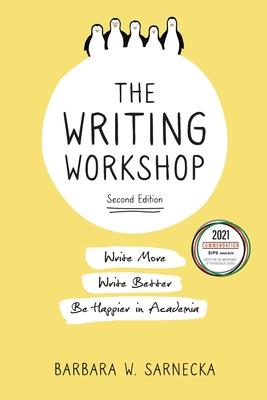Research is all about writing, but most PhD programs don't teach students how to produce the writing needed to get a PhD, publish research, or win fellowships and grants. Plus, the academic environment can feel as cold and harsh as the South Pole. But just as penguins form social huddles to survive the Antarctic winter, researchers can form writing groups to help them learn how to write more, write better and be happier in academia. The Writing Workshop tells you everything you need to know about forming and running a successful writing group, and provides invaluable tips on how to become better at and more comfortable with academic writing. Written by a professor of Cognitive Sciences and Associate Dean of Graduate Studies at the University of California-Irvine, this friendly guide is aimed at early-career researchers such as PhD students and postdoctoral scholars. Topics include how to form and run a writing workshop; how to plan research and writing projects over the long term (one to five years), medium term (ten to fifteen weeks), and short term (one week); how to establish and maintain a regular writing practice; how to write a literature review, a research article, a funding proposal or a presentation; and how to revise for clarity at the document, paragraph, sentence and word levels. Running through the book is the theme of well-being, and the idea that creativity comes from self-compassion rather than self-punishment. Writing is not only a way of producing scholarly output, but also a way of thinking, learning and generating new ideas. A regular writing practice grounded in a supportive community is something that every early-career scholar deserves and, with this book, it's something every early-career scholar can have.

The Writing Workshop: Write More, Write Better, Be Happier in Academia
Research is all about writing, but most PhD programs don't teach students how to produce the writing needed to get a PhD, publish research, or win fellowships and grants. Plus, the academic environment can feel as cold and harsh as the South Pole. But just as penguins form social huddles to survive the Antarctic winter, researchers can form writing groups to help them learn how to write more, write better and be happier in academia. The Writing Workshop tells you everything you need to know about forming and running a successful writing group, and provides invaluable tips on how to become better at and more comfortable with academic writing. Written by a professor of Cognitive Sciences and Associate Dean of Graduate Studies at the University of California-Irvine, this friendly guide is aimed at early-career researchers such as PhD students and postdoctoral scholars. Topics include how to form and run a writing workshop; how to plan research and writing projects over the long term (one to five years), medium term (ten to fifteen weeks), and short term (one week); how to establish and maintain a regular writing practice; how to write a literature review, a research article, a funding proposal or a presentation; and how to revise for clarity at the document, paragraph, sentence and word levels. Running through the book is the theme of well-being, and the idea that creativity comes from self-compassion rather than self-punishment. Writing is not only a way of producing scholarly output, but also a way of thinking, learning and generating new ideas. A regular writing practice grounded in a supportive community is something that every early-career scholar deserves and, with this book, it's something every early-career scholar can have.